Aside from being good band names, “Taildragger” and “High-Wing Monoplane” are two ways to describe this 1946 Taylorcraft BC12-D. Taylorcraft Aviation Corporation made some nice planes that were less expensive than the usual suspects: i.e., Piper, Cessna, etc. The seller has this barn find flyer listed here on Facebook Marketplace in Ashtabula, Ohio and they’re asking $8,000. Here is the original listing, and thanks to Jima for the tip!
Jeff Lavery showed us a Taylorcraft here on Barn Finds in early 2021 and they are known to be well-designed, nice weekend fliers or training aircraft. With automobile-type doors that swing open, side-by-side seating, and wheel-type controls rather than a stick, they’re a bit unusual, especially at their original price point when compared to a Piper Cub, Cessna 140, or Aeronca. Taylorcraft’s Model B-series was made in the 1930s and 40s in large numbers in a variety of model variations.
Speaking of the Cub, a gentleman named Clarance Taylor designed both aircraft and they have some similarities, but the aforementioned seating arrangements, car-style doors, and not having a stick on your right hand and throttle in your left hand are some differences. The Tayorcraft was available as a seaplane, or floatplane, and also in landplane configurations from the factory.
You can see the fancy interior in the photo above of the side-by-side cockpit configuration, with two wheels rather than sticks for controlling the plane. The construction of these planes is a skeleton of welded steel tubing that’s covered by aircraft fabric treated with plasticized lacquer, sometimes known as “doped fabric”. Which again isn’t a bad band name, now that I think about it. The back seat is positively luxurious in size and materials and you can see that this example will need a lot of work in order to get it in the air again.
This a single-engine plane and should, I believe, be fitted with a Continental A-65 with 65 horsepower. An 85-hp model was also available. There’s no fancy electric start here, have a friend stomp on the heel brakes and do your best spinning the prop to get this baby started. That is, after doing a lot of work on it first. And then there’s that price. The amount of work that’s needed to get this plane certified and in the air again makes me sweat, is this one worth the effort?
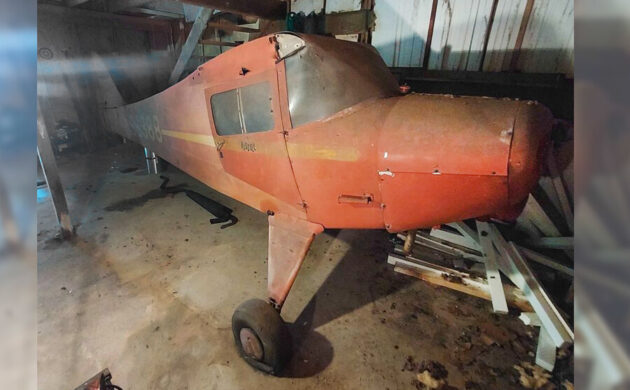
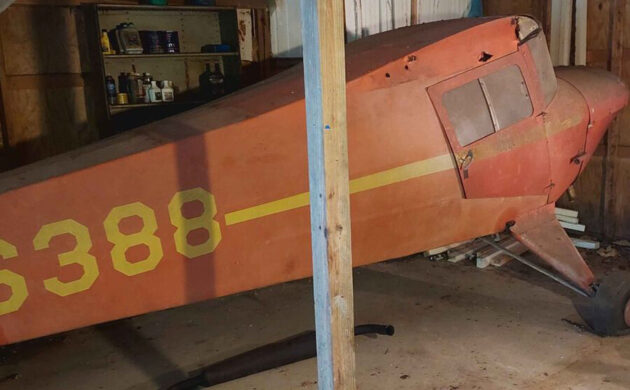
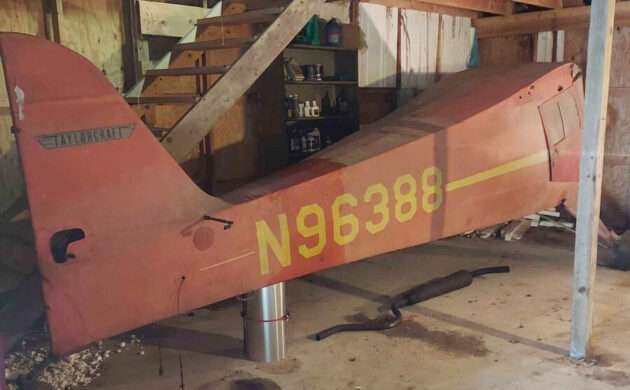
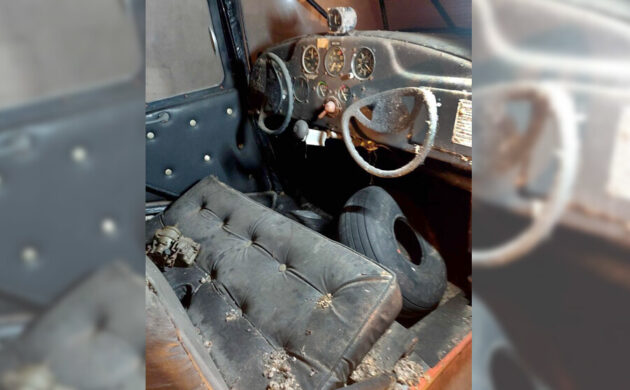
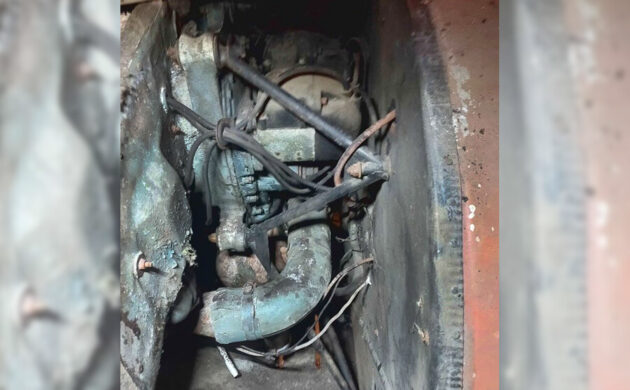






Not particularly a fan of single engine aircraft. Old motors sometimes stop running. I would think this would have to be taken almost completely apart and reassembled and then don’t aircraft have to be inspected or certified to fly again? There are rodent signs in the cockpit so I think the seller is being optimistic, but there is a new old tire in the cockpit!
Those old Continental engines are pretty reliable. The same design has been in production for many a decade and are subject to huge amounts of FAA testing to prove that reliability. Had one in our 46 Aeronca 7AC for many years until we put an 85 HP Continental in. This T-crate is in need of a full rebuild for sure. A person can find them quite easily in airworthy shape for around 20-25K so *K for a basket case is a bit steep.
In the unlikely event of an engine failure, then your Taylorcraft becomes a glider. An old plane like this probably has a glide ratio of around 10:1. They don’t just drop from the sky if they lose engine power, it doesn’t work like that. It was common practice during my flight training in the early 90’s to have the instructor decide to reach out and pull the engine power back to idle. To the amazement of some people out there, we didn’t become a lawn dart and dive to the ground. You don’t panic, trim/flaps for optimal gliding, find a suitable place to put her down, and land her carfully.
Sitting that long and with NO logbook? It would cost a fortune to get this to pass an annual inspection for the FAA. Everything needs to be redone. Wiring, cables, frame, engine, avionics… I could go on. Best to make it into a backyard toy for the kids.
Jerry is so right about his FAA inspection estimate cost.
At 1st glance, i thought the ad said Tollycraft 🛥
I’m thinking parts plane for a damaged one with logbooks. Can’t imagine this one will ever see wind under its wings again. If it were a Cub, it would be a different story.
The Youtube algorithm has been feeding me STOL videos lately, amazing stuff. Everything on those videos appears to be in much better shape than this LOL.
“My first customer was a lunatic.”
“My second customer had a death wish.”
Karl Benz
I have a set of plans that converts the Taylorcraft into one if these…
https://www.eaa.org/eaa-museum/museum-collection/aircraft-collection-folder/1938-taylorcraft-cole-bf-50-clipped-wing—n21292
It would be a fun project, and you would end up with a more powerful aircraft capable of aerobatics. The result would probably be worth much more than a stock Taylorcraft. And if you did the work yourself, as an EAA homebuilt, you might break even on the project as long as you didn’t count your time as part of the build cost.
Nope. This type of aircraft requires FAA certification.
“Hey Gomer, Let’s take it out for a spin on Highway RTE 37. YEE HAW!!”
This belongs hanging from the ceiling at Cabela’s!
I think it’s been let go to long its now scrap or art depending upon your taste but I would love to Tinker with the engine and see if I can get it running
The “controls” on this plane are called, yokes; they are common on nearly all GA aircraft, although these are closed yokes such as one would find on an old Cessna 150.
Anyone interested in this should know the incredible uphill climb to restore this to an airworthy status. It will probably be worse than any rusted out hulk seen on BF prior. I was going to list all of the things that would be needed, but *everything* will suffice.
After it is finished, it will still be a low-powered VFR plane with no electrical system, no radio – and no logbook. No sane A&P is going to sign off on repairs to this thing unless he witnessed or was part of the project, and if he were sane he wouldn’t be part of it.
Best I could find is that it may have been flying in 1974, based on the Antique Classic emblem and the Airworthiness Certificate issued 1972. I like the idea of hanging it in a museum somewhere, after the rats nests are cleaned out and it is washed to make it presentable. $8,000.00 would be great for the seller, but for the buyer – even free would be an incredible liability.
That A65 cleaned up is probably worth $8k
I think this is very similar to the aircraft that the YouTube moron Trevor Jacob deliberately crashed and faked a bailout. And unfortunately that one was in good shape.
Make the wings hinge like sunglasses about midway (on offset fully braced hinges). Mount the wheels and elevated rear skeg to an ultralight 10′ x 20 shaped positive flotation hull with aluminum hull and deck, sandwich foam cell, full bilge. Restore the engine and controls. ‘Fly’ it on a lake, playing with lift and turning controls. Hull would have a sturdy 2″ wire cow nose at front to keep debris out of prop. At rear a power tilt electric trolling motor. Solar panels on the roof, battery cabinet above/on deck under fuselage in fully weatherproof submersible chest. It might cost $100k. Probably capable of 40mph or more at cruising speed. Long distance on smooth water probably more fuel efficient than outboard prop or inboard drag. You’ll be skimming on top of the water, just center groove cutting through the water. Wouldn’t do well in anything over 3 foot chop or swells.
I”m pretty sure if it leaves the ground, the FAA has jurisdiction. There are ultra-light aircraft, which get around a lot of rules/codes (as long as you stay below a certain height), but something this size is too big & heavy.
They may have jurisdiction but they have to catch you first. If you fly occasionally, live in a rural area, keep a low profile and don’t post to social media you could get away with it for a while. I “have a friend” who, back in the day when he had no money, drove his project car at night and on the weekends for years without any issues when it was clearly not road legal
First it needs complete rebuild. This is not modern in any sense of the word.
Easily rebuilt with the build using more modern materials, fabric, lacquer, cables, and the engine is the easy part. Prop would concern me but have a new one made, probably the most expensive part.
Then off to any South American country to fly anytime you want.
Flew up and down the California coast in a friend’s. Liked that cork bobber on the cowl, used as a fuel gauge! You can see it in one foto.